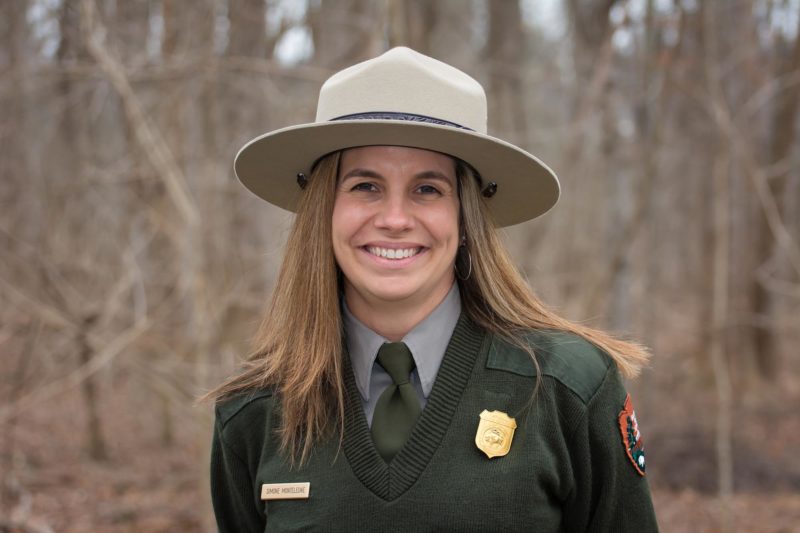
Simone Monteleone ’96 grew up in New York City, so it’s not surprising that the first national park she ever visited was the Statue of Liberty.
“I was in school at the time — I can’t remember how old I was — but it was a pretty exciting trip,” she said, adding that the day included a ferry ride to Liberty Island and a side trip to Ellis Island, where millions of immigrants were welcomed to the U.S. between 1892 and 1954.
“For me in particular, that was really exciting because on my father’s side of the family they came through Ellis Island when they emigrated from Italy, so it was a good connection, to be able to see where my ancestors came into America.”
Today, Monteleone is the superintendent of another national park, Minute Man National Historical Park. Located in Lexington, Lincoln, and Concord, Massachusetts, the park “preserves and interprets the sites, structures, and landscapes that became the field of battle during the first armed conflict of the American Revolution.”
Monteleone says there’s not really a “typical day” at the park, but that’s something she likes about the position, which she’s held for about a year now. “Every day is a little bit different,” she said. “A lot of the work I do is focused on engaging with the local communities and partners.
“Supporting park staff for interpretation and programming and the day-to-day operations of the park itself, and then long-range planning of the park, is kind of within my wheelhouse. For us in particular, we have a big anniversary — the 250th anniversary of the opening battle of the American Revolution — in April of 2025.
“That’s a pretty big deal for us. We’re kind of the opening act, we’ll say, for the commemoration.”
It’s the preservation aspects of her job, however, that first attracted Monteleone to the park service.
“One of the biggest things that guided me in making the switch from the private sector to the National Park Service was the mission: preservation and protecting these special places for not just current visitors but for future visitors as well,” she said.
“That was important to me and one of the main draws, as well as having the opportunity to do public service.”
Recently, Minute Man National Historical Park was awarded $27 million from the Great American Outdoors Act. It will be used to rehabilitate and preserve the site’s 16 historic structures, trail system, landscaping, and monuments, including “The Minute Man” sculpture, created by Daniel Chester French, who later sculpted Abraham Lincoln for the Lincoln Memorial in Washington, D.C.
Monteleone also is working closely with the Massachusetts Department of Transportation to ensure a planned road-paving project won’t negatively impact the park.
“A lot of the work we’ve been doing in consultation with MassDOT is trying to find areas of compromise, where they can get the work [done] … but do it in a way that is sensitive to the parkland around the road,” she said.
Monteleone joined the National Park Service after nine years in the private sector, during which she did work for a number of U.S. government agencies, including the Department of Defense.
In 2007, she became historian and cultural resources program manager at Rock Creek Park in Washington, D.C. Since then, she has held posts at Richmond National Battlefield Park, the Maggie L. Walker National Historic Site, George Washington National Parkway, and the NPS’s Division of Cultural Resources, Partnerships, and Science in Atlanta.
She also worked with the Section 106 Compliance-Hurricane Recovery Team, a unit that deals with storm recovery at the national parks. After Hurricanes Irma and Maria struck the Caribbean in 2017, for example, she did work at Christiansted National Historic Site and Virgin Islands National Park, both located on U.S. territory.
An English major, history minor, and softball player at Lynchburg, Monteleone credits her Lynchburg experience with being “the foundation of understanding the importance of history and preservation.” She added that it also “helped me lay the building blocks for my graduate work after Lynchburg.”
In particular, she’s thankful for two individuals — her softball coach, the late Coach Aubrey Moon Jr. ’56, and English Professor Dr. David Lipani.
“I would say there were two folks who were most influential, although they probably didn’t realize it at the time,” Monteleone said. “Coach Moon … was very supportive of me taking a season off to do an internship at Thomas Jefferson’s Poplar Forest. That internship really convinced me where I wanted to go in my career, in terms of historic preservation.
“And Dr. Lipani … was very influential in helping me understand the power of writing and history tied all together. Understanding that being able to articulate positions can be very influential in a variety of ways.
“Neither one of them probably ever realized how influential they really were.”

